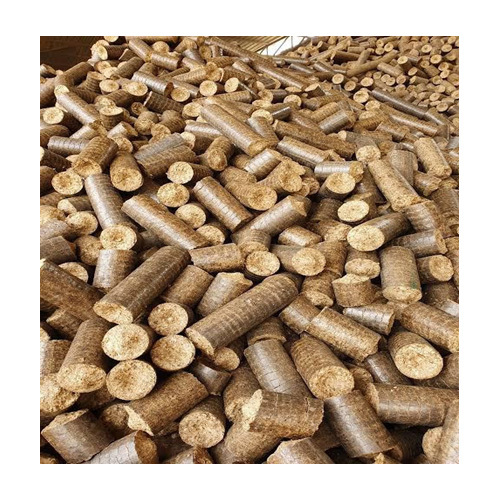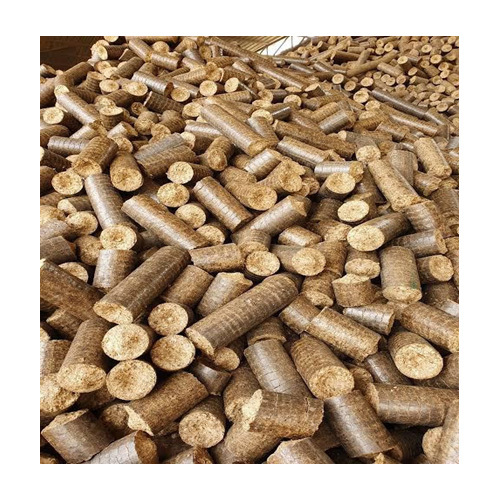90mm Groundnut Shell Briquettes
Product Details:
- Size 90mm
- Gross Calorific Value 3800+kcal
- Material Groundnut shell
- Shape Cylindrical
- Moisture (%) 10%
- Ash Content (%) 6%
- Click to View more
90mm Groundnut Shell Briquettes Price And Quantity
- 10 Ton
- 11500.0 INR/Ton
90mm Groundnut Shell Briquettes Product Specifications
- 3800+kcal
- 90mm
- 10%
- 6%
- Groundnut shell
- Cylindrical
90mm Groundnut Shell Briquettes Trade Information
- Cash in Advance (CID)
- 7 Days
- Contact us for information regarding our sample policy
- pp bag
- All India
Product Description
Groundnut Shell Biomass Briquettes are solid biofuel blocks made from compressed groundnut (peanut) shells, a highly calorific agricultural by-product. With a dense 90mm diameter, these briquettes provide a calorific value of over 3800 kcal/kg, moisture content of 10%, and ash content of 6%, making them a reliable alternative to coal or firewood for industrial boiler systems. Priced at Rs 11.5/kg, they ensure cleaner combustion, better efficiency, and long-term fuel savings for industries.
Product Specifications:
| Parameter | Value |
|---|---|
| Diameter | 90 mm |
| Raw Material | Groundnut Shells |
| Calorific Value | 3800+ kcal/kg |
| Moisture Content | 10% |
| Ash Content | 6% |
| Price | Rs 11.5/kg |
| Application | Industrial Boilers, Steam Systems |
-
Strong Calorific Value (>3800 kcal/kg): Efficient energy output ideal for high-demand boilers.
-
High-Density Biomass Fuel: Made from tough, fibrous groundnut shells for slow, long-lasting burn.
-
Moderate Moisture (10%): Easy to ignite with stable combustion.
-
Low Ash (6%): Reduces fouling and cleanup time in boilers.
-
Eco-Conscious Choice: Utilizes agro-waste, cuts carbon emissions, and helps curb deforestation.
-
Fuel Cost Optimized: Priced competitively for consistent industrial operations.
Applications & Use Cases:
-
Steam Boilers in Agro, Textile & Pharma Industries
Suitable for medium to large-scale boilers needing steady heat supply. -
Food Processing & Dairy Plants
Offers consistent heat for cooking, drying, or pasteurization processes. -
Kilns, Furnaces & Foundries
Reliable replacement for coal in heat-intensive manufacturing setups. -
Hybrid & Biomass-Only Power Plants
Can be used in co-firing or pure biomass energy generation setups.
Frequently Asked Questions (FAQs)
Q1. What are groundnut shell biomass briquettes?
A1. Theyre solid fuel blocks made from compacted groundnut shells, offering high combustion efficiency with low emissions.
Q2. Are they suitable for replacing coal in industrial boilers?
A2. Yes, with over 3800 kcal/kg energy value, they can match mid-grade coal performance in compatible boiler systems.
Q3. What boiler types can use these briquettes?
A3. They are ideal for manually-fed and semi-automatic solid-fuel boilers.
Q4. Do they leave a lot of ash behind?
A4. No, ash content is moderate (6%), making cleanup easy and safe for standard ash-handling systems.
Q5. Can they be stored in open environments?
A5. It's best to store them in a dry, covered area to avoid moisture absorption and preserve combustion quality.
Q6. Are they environmentally sustainable?
A6. Absolutely. They are made from renewable agro-waste and help industries shift away from fossil fuels.

Price:
- 50
- 100
- 200
- 250
- 500
- 1000+



